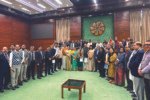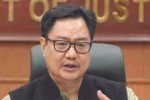NEW DELHI, April 30: The Delhi High Court on Tuesday observed that unauthorised constructions were going on galore in disputed Waqf properties and no one was looking after them, as it stressed the need for proper monitoring.
The high court flagged the issue relating to the dispute about 123 properties, on which the Delhi Waqf Board lays its claim while the Centre has de-listed them, and said some of them are very lucrative properties in Delhi and are in the heart of the city.
A bench of Acting Chief Justice Manmohan and Justice Manmeet PS Arora referred to one of the cases dealt by it in which the property in Nizamuddin East, branded as a Waqf property, was sold multiple times after which a hotel was constructed on it without any permissions.
“When we asked the authorities what they were doing and how this happened? We were told that a dispute was going on between the Waqf board and the DDA as to whom the property belonged.
“In this dispute, no one is looking after the properties and they are virtually encroached or someone from these two departments is facilitating multiple purchases and unauthorised construction is going on galore. We don’t know if Waqf is being involved,” the bench said.
The court said the institution was being “misused totally today” and no one was looking after the properties and that someone would have to monitor it.
The court’s oral observations came while hearing a plea that sought the removal of Ashwani Kumar, Principal Secretary (Home) of the city government, as the administrator of the Delhi Waqf Board accusing him of acting against the interest of Waqf properties.
As the court was informed that a petition with a similar prayer challenging the appointment of the administrator of the Delhi Waqf Board was pending before a single judge who had reserved its order, the division bench asked the counsel for the authorities to seek instructions on the issue.
The bench listed the matter for further hearing on May 8.
The plea said the administrator of the Waqf Board is also the chairperson of the religious committee which has recommended the “removal and demolition” of several Waqf properties.
“The administrator in an organisation is appointed for the welfare and betterment of the organisation and such person has to protect the interest of that organisation.
“However, in the present case, the administrator of the Delhi Waqf Board is acting totally against the Waqf properties. Instead of protecting them, he is sitting to destroy the Waqf properties,” the plea, filed by Secular Front of Lawyers, alleged.
The petitioner, represented by senior advocate Salman Khurshid and lawyers Imran Ahmad and Rohit Sharma, said in the last one year, the religious committee has recommended the “removal/demolition” of several Waqf properties including Dargah Mamu Bhanja, Sunehri Bagh Masjid, Masjid Madarsa Kangal Shah and Akhoondji Masjid.
The petition said a major portion of Dargah Mamu Bhanja has been demolished and Akhoondji Masjid, which was more than 600 years old, has been completely razed on the “erroneous recommendation” of the religious committee.
It said the Delhi Waqf Board was dissolved on August 26, 2023, as its statutory term of five years had expired. Ashwani Kumar was appointed as the administrator of the board on January 10, 2024.
“As a chairman/head of the religious committee, he is passing orders for removal/ demolition of Waqf properties which are outside his jurisdiction.
“In the capacity of administrator, Respondent No.3 (Kumar) is sitting over the Delhi Waqf Board interfering in policy matters and in the capacity of Additional Chief Secretary, Revenue, he is the head of the Revenue Department from which the board receives Grant in-aid for its expenses,” the plea said.
The plea claimed that Waqf properties are out of the preview of the religious committee as its domain is to recommend the removal of only unauthorised and illegal religious structures on public land.
The petition has arrayed the Delhi government, Revenue Minister Atishi, Ashwani Kumar, Delhi Waqf Board and Delhi Waqf Council as respondents. (PTI)












